Brian Gongol
Keeping Economic Fluctuations in Perspective
There's a great deal of popular talk about how "bad" the economy seems to be and, on occasion, it can be easy to get swept up in a moment of fervor. Senator John Kerry, in his 2004 speech accepting the Democratic Party's Presidential nomination, said:
"They say this is the best economy we've ever had. And they say that anyone who thinks otherwise is a pessimist."Clearly, Senator Kerry is engaging in grand political hyperbole, because anyone who would argue that this is not the best economy we have ever had isn't just a pessimist; he or she is plainly ignorant.
- (BBC transcript)
There is nothing wrong with observing that the economy, from time to time, rides out fluctuations. Clearly, some weeks, months, quarters, and years are better than the ones before, and others are worse. But that observation holds true only on a very short time horizon.
Improvement is built into a free-market system, like the one we enjoy in the United States. Things must get better over time; for them not to do so would require not only that we defy the logic of scientific and technological progress, but also that we reject human nature.
As classically observed in Adam Smith's Wealth of Nations,
"It is not from the benevolence of the butcher, the brewer, or the baker, that we expect our dinner, but from their regard to their own interest. We address ourselves, not to their humanity but to their self-love, and never talk to them of our own necessities but of their advantages. Nobody but a beggar chuses to depend chiefly upon the benevolence of his fellow-citizens."Smith made it clear (and it has been expounded upon forever since) that humans are self-interested. We act so that we, and more importantly, our children, can have our necessities fulfilled along with a maximum of the available comforts. In other words, for the economy not to get better over any short period of years (not to mention any long period) would require that people no longer belive in or behave according to their own self-interest.
- (Library of Economics and Liberty)
With that in mind, here are some important facts that support the theory. If the following do not persuade the reader that this truly is the best the American economy has ever been, then the reader is plainly hostile to the notion of evidence. There is nothing that can be done for someone who believes in the modern world that the earth is flat, and similarly nothing can be done for one who does not believe that American capitalism has made us richer, happier, healthier, and more comfortable than any society of the past.
|
Income
On the most basic scale, we earn more today than any previous generation. Discounted for inflation (which is why a 25-cent cup of coffee now costs $1.00), the average American worker today makes more money than any American worker in history. Earnings are the absolute bottom line against which we can evaluate an economic system. Without earnings, we have nothing with which to buy bread, medicine, or electricity. We illustrate here earnings as the per-capita disposable personal income, which is economist-speak for every dollar earned in America, divided by how many people live here. The values here are in "constant" 1996 dollars, which means that the best effort has been made to make sure that the $1 shown for 1930 would have bought about the same goods as that same $1 would have bought in 2000. Clearly, if disposable income is your yardstick, things are better now than they have ever been. |
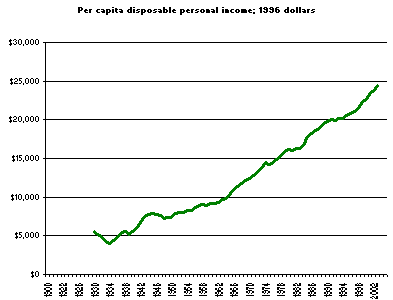
- (Statistical Abstract of the United States) |
|
Life Expectancy
There are those who would say that we shouldn't measure income, but rather health and well-being. To that, the evidence is crystal-clear as well. Never mind that polio was defeated and smallpox vanquished, the measles immunized against and tuberculosis contained. Ignore tremendous advances in dental care, surgery, antibiotics, and psychological care. Any one of those is a cause for celebration, and that they all happened during a few short decades should be reason enough to believe that the system works. Let's take the broadest possible barometer and examine life expectancies. In short, we've added a bonus 50% on to the life expectancy of the average American over what he or she would have had in 1900. The number shown here is life expectancy at birth, and the incredible increase represents how long the average American of any race can expect to live when born in the year shown. The trend is absolutely clear. |
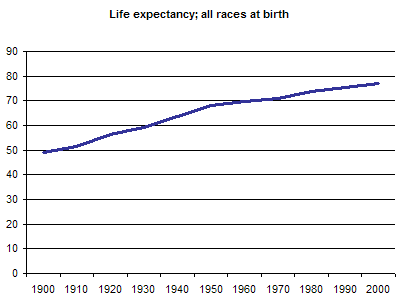
- (National Vital Statistics Reports) |
|
Education
Suppose, however, that you don't care whether you make money, nor whether your life is long and healthy. Suppose that your only measurement of the economy is whether you can live a life of the mind. Since it's reasonable to assume that education and economic performance are correlated, better school attendance should be a sign (and cause) of an improving economy. The evidence substantiates that things have never been better from this perspective as well. More Americans attend high school today than ever before. In fact, over the course of the century, it's not even close. The ratio of truants today is equal to the ratio of all students who even attended in 1900. In short, it really has never been better. |
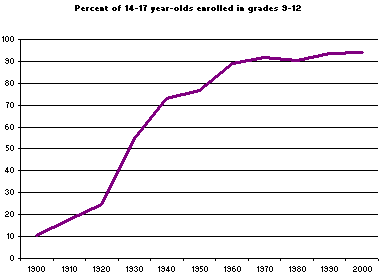
- (Education Summary, Statistical Abstract of the United States) |
|
Travel
If travel is one's measuring rod, the economy could be measured in terms of trips taken. While it's difficult to accurately count the number of road trips, we have a very good idea of the number of times Americans board airplanes -- after all, tickets must be issued, security checkpoints cleared, and suitcases lost. Once again, there is absolutely no mistake to be made: If travel is your metric, this is the best economy we have ever had. The number of American passengers on board airplanes is up more than seven times over just a few decades ago. And we've only been enjoying powered flight for a century. |
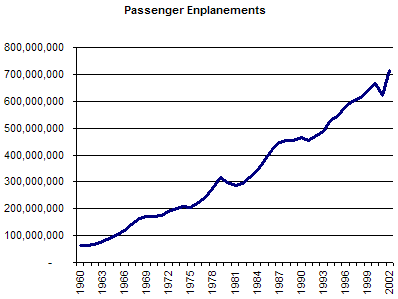
- (Historical Air Traffic Statistics, 1954-1980, Historical Air Traffic Statistics, 1981-2001) |
|
Appliances
Finally, should one persist in disbelieving that this is the best economy we have ever had, we offer a truly basic measurement. If an economy is truly working well, then the benefits of that economy should show up even in the little places -- like the home. And once again, we find irrefutable evidence that this is the best economy we have ever had. It takes no stretch of the imagination and no leap of faith to observe that the percentages of American households enjoying comforts like air conditioning and microwave ovens has risen strongly in just a few decades. For those using home size as the measurement, we offer that the number of homes with six or more rooms (not including bathrooms) has risen 10% in two decades. Considering that homes are the biggest of "big-ticket" items, and that old ones are slow to be demolished, this is an achievement. The widespread adoption of the microwave (from less than 10% in 1978 to almost 90% today) is surely a sign that things are better today than they ever were before. Suppose that the only reason one would not own a microwave is poverty. Even holding that very harshest of assumptions, almost half of the very poorest 20% of families today would still own a luxury tool that didn't even exist a few decades ago. It should also be noted that the appliance measurement holds practically universally -- more homes have cable or satellite television, refrigerators, large-screen TV's, stereos, and indoor plumbing than ever before. |
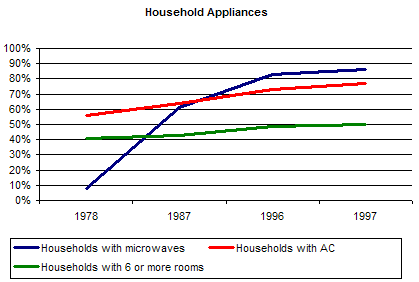
- (Changes in Energy Usage in Residential Housing Units, 2001 Residential Energy Consumption Survey) |
Conclusion: Greed Fulfills Need
While it would be unwise to suggest that fluctuations don't occur (they certainly do, and both recessions and boom periods come and go), it's equally unwise (not to mention deceptive and even dishonest) to suggest that the economy isn't the best it's ever been. Capitalist, free-market systems must grow and improve by their very architecture. Greed fulfills need. And as needs (or wants) expand, so must the products to fill them.
While change is inevitable under our system -- and occasionally painful -- it's reckless and false to suggest that things aren't always getting better under capitalism. There are surely fits and starts, rough periods and adjustments to be made, but it always gets better within a generation -- usually markedly so -- and it gets so much better in the long run that we can barely find adequate measurements to compare today with a century ago. It is a sad misfortune that some find their own proposals and policies so devoid of sense that they ask the rest of us to pretend that the facts are anything but what they clearly are.
